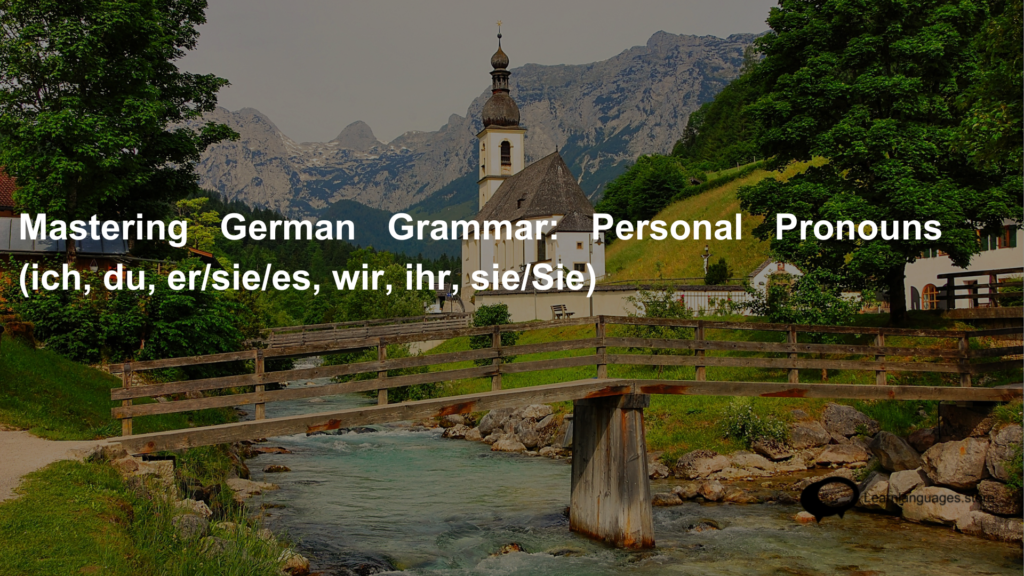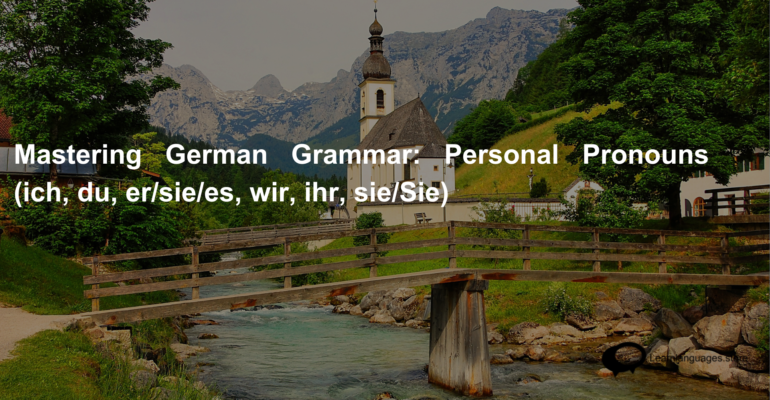Mastering German Grammar: Personal Pronouns (ich, du, er/sie/es, wir, ihr, sie/Sie)
Mastering German Grammar: Personal Pronouns (ich, du, er/sie/es, wir, ihr, sie/Sie)
Estimated reading time: 5 minutes
Welcome to the Learn Languages Store blog! Today, we’re diving into one of the core elements of German grammar: personal pronouns. Understanding how to use personal pronouns like “ich,” “du,” “er/sie/es,” “wir,” “ihr,” and “sie/Sie” is essential for constructing sentences and communicating effectively in German. This comprehensive guide will help you grasp the usage of these pronouns with practical examples, translations, and pronunciation guides. By the end of this blog, you’ll have a solid understanding of German personal pronouns and be ready to take your learning to the next level with our paid courses.

Why Are Personal Pronouns Important in German?
Personal pronouns are used to replace nouns and refer to people or things in a sentence. In German, like in English, pronouns change depending on the subject of the sentence. Mastering these pronouns is crucial because they are the building blocks of everyday communication. Let’s explore each pronoun in detail and see how they are used in sentences.
Personal Pronouns in German
- Ich (I)
- Pronoun: ich
- Translation: I
- Usage: Used when the speaker is the subject of the sentence.
- Ich lerne Deutsch.
Translation: I learn German.
Pronunciation (Hindi): इख लर्न डॉइच. - Ich gehe zur Schule.
Translation: I go to school.
Pronunciation (Hindi): इख गहे त्सुअर शुले. - Ich habe einen Hund.
Translation: I have a dog.
Pronunciation (Hindi): इख हाबे आइनेन हूंड. - Ich mag Kaffee.
Translation: I like coffee.
Pronunciation (Hindi): इख माग काफे
- Du (You – singular informal)
- Pronoun: du
- Translation: You (singular informal)
- Usage: Used when addressing one person informally.
- Du bist mein Freund.
Translation: You are my friend.
Pronunciation (Hindi): डू बिस्ट माइन फ्रॉइंड. - Du spielst Fußball.
Translation: You play football.
Pronunciation (Hindi): डू श्पीलस्ट फूßबाल. - Du hast eine Katze.
Translation: You have a cat.
Pronunciation (Hindi): डू हास्ट आइने कात्से. - Du kommst aus Indien.
Translation: You come from India.
Pronunciation (Hindi): डू कॉम्स्ट आउस इंडियन. - Du isst gern Schokolade.
Translation: You like eating chocolate.
Pronunciation (Hindi): डू इस्ट गेर्न शोकोलाडे.
- Er/Sie/Es (He/She/It)
- Pronoun: er/sie/es
- Translation: He/She/It
- Usage: Used to refer to a male person (er), female person (sie), or a neutral object/thing (es).
- Er spielt Gitarre.
Translation: He plays guitar.
Pronunciation (Hindi): एर श्पील्ट गिटारे. - Sie liest ein Buch.
Translation: She reads a book.
Pronunciation (Hindi): ज़ी लीस्ट आइन् बूख. - Es regnet heute.
Translation: It is raining today.
Pronunciation (Hindi): एस रेगनेट होयटे. - Er trinkt Wasser.
Translation: He drinks water.
Pronunciation (Hindi): एर ट्रिंक्ट वास्सर. - Sie kocht das Abendessen.
Translation: She cooks dinner.
Pronunciation (Hindi): ज़ी कोख्ट दास आबेंडेसन.
- Wir (We)
- Pronoun: wir
- Translation: We
- Usage: Used when the speaker is part of a group.
- Wir gehen ins Kino.
Translation: We are going to the cinema.
Pronunciation (Hindi): वीर गहेन इन्स कीनो. - Wir lernen Deutsch.
Translation: We learn German.
Pronunciation (Hindi): वीर लर्नन डॉइच. - Wir haben ein Auto.
Translation: We have a car.
Pronunciation (Hindi): वीर हाबेन आइन् आउटो. - Wir spielen Karten.
Translation: We play cards.
Pronunciation (Hindi): वीर श्पीलन कार्टन. - Wir wohnen in Berlin.
Translation: We live in Berlin.
Pronunciation (Hindi): वीर वोह्नन इन बर्लिन.
- Ihr (You – plural informal)
- Pronoun: ihr
- Translation: You (plural informal)
- Usage: Used when addressing more than one person informally.
- Ihr seid meine Freunde.
Translation: You are my friends.
Pronunciation (Hindi): ईर ज़ाइद माइने फ्रॉइंडे. - Ihr spielt zusammen.
Translation: You play together.
Pronunciation (Hindi): ईर श्पील्ट त्सुज़ामेन. - Ihr habt viel Zeit.
Translation: You have a lot of time.
Pronunciation (Hindi): ईर हाब्ट फील साइट. - Ihr kommt aus Deutschland.
Translation: You come from Germany.
Pronunciation (Hindi): ईर कॉम्ट आउस डॉइचलांड. - Ihr trinkt Kaffee.
Translation: You drink coffee.
Pronunciation (Hindi): ईर ट्रिंक्ट काफे.
- Sie/Sie (They/You – formal)
- Pronoun: sie (they)/Sie (you – formal)
- Translation: They/You (formal)
- Usage: “sie” is used to refer to a group, and “Sie” is used to address someone formally.
- Sie gehen nach Hause.
Translation: They are going home.
Pronunciation (Hindi): ज़ी गहेन नाख हौज़े. - Sie sprechen Englisch.
Translation: You (formal) speak English.
Pronunciation (Hindi): ज़ी श्प्रेचेन इंग्लिश. - Sie spielen Fußball.
Translation: They play football.
Pronunciation (Hindi): ज़ी श्पीलन फूßबाल. - Sie trinken Tee.
Translation: You (formal) drink tea.
Pronunciation (Hindi): ज़ी ट्रिंकन टे. - Sie wohnen in München.
Translation: They live in Munich.
Pronunciation (Hindi): ज़ी वोह्नन इन म्यूनचेन.
Why You Should Enroll in a German Course
Understanding and correctly using personal pronouns is a crucial step in mastering the German language. However, learning on your own can be challenging. That’s why Learn Languages Store offers comprehensive German courses that guide you step by step through the complexities of the language. Our A1 level German course is designed to give you a strong foundation in grammar, vocabulary, and pronunciation, ensuring that you speak with confidence.
Contact Us Today:
- Address: 330, 3rd Floor, Big Splash (Near Vashi Bus Depot), Sector 17, Vashi, Navi Mumbai, Maharashtra 400703
- Phone: +91-9594113111
- Email: services@learnlanguages.store
For just Rs 16,300, our A1 level course offers you expert instruction, interactive lessons, and plenty of practice materials to help you master German. Whether you’re a beginner or looking to improve your skills, our courses are tailored to meet your needs.
Sign Up Now!
Contact us today to learn more about our paid courses and how they can help you achieve your language learning goals!










